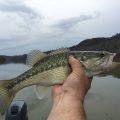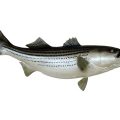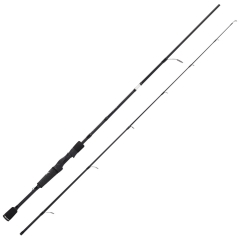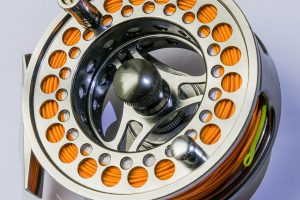The short answer is yes, bass are cold blooded like most fish, amphibians, and reptiles. This means they need to be in a situation where it doesn’t get too cold to completely slow them down or they enter a state of inactivity till it warms back up. This put a bass of risk of death due to being prey of a different animal or dying from being in water that gets too cold. Bass being a cold-blooded animal is likely not a question that keeps you up at night (unless you are a marine biologist, I suppose), but now that you think of it. First, let’s lay down the ground rules and understand exactly what warm blooded and cold-blooded mean.

Warm blooded VS. Cold blooded
A good way to grasp these terms is to think of your central heating and air in your home.
Warm blooded animals, like you and me, are like your house. We have a built-in organic body temperature regulation system. Like your house, our bodies have a thermostat setting of roughly 98.6 degrees. When external factors cause our body temperature to drop below that then we can kick our furnace on by shivering or moving around to burn more energy, and if external factors cause our body temperature to rise, then our body’s organic “Air conditioning” kicks in by sweating.
Cold blooded creatures do not have this feature. Their body temperature is regulated by the external factors of their environment. One benefit to this is that their bodies conserve more energy, given that they aren’t spending it running the “Furnace” or “A/C”. Rather, when it gets cold out, their bodies go into an “Economy mode” of sorts which is called torpor. Torpor is when the body slows down its functions dramatically to allow it to survive. Their metabolism slows down and, thus, their overall movements and functions, until they are able to warm back up (in a sunny spot or temperature raises). In the warm weather, they are more energetic, with a higher metabolism.
Why does it even matter what their blood temperature is?
An excellent question. Take a moment to think about the environment that aquatic species live in. Water is wet and typically used to cool off. You are likely rolling your eyes now and thinking, “Duh!” Hang with me for a moment. Maybe try it from this angle. We use water as a means for cooling off, right? When It’s hot out nothing sounds better than hopping into some cool water to beat the heat. Now imagine you cannot leave it. It gets rather cold for us warm blooded folks, doesn’t it? That is because the water temperature is lower than our body temperature. Now our “furnace” kicks on and we start an endless battle to regulate our body temperature. This may not sound too bad, but in regard to metabolic energy, it is expensive! If bass were warm blooded creatures, this would be a constant drain on their bodies. If bass are cold blooded, then they can more easily adapt to their environment’s temperature changes.
Bass can rest easy though.
Thankfully for the bass, it, like most other fish, is cold blooded. Interestingly this knowledge bears practical uses in that it helps us know the “optimal functioning” temperature for bass. The optimal temperature for these cold-blooded bass is between 60 degrees and 75 degrees. This makes sense, based on what we’ve learned through our explanation on cold blooded animals. When the temperature gets below this optimum temperature the bass will go slow down and drop into “economy mode” and won’t really be doing much of anything. If the temperature gets too high, then they will have to slow down because, the oxygen levels in the water decrease as the temperature increases (and the bass’s body needs ample oxygen levels to continue to burn energy). Thus, 60-75 degrees is the optimum temperature for functioning. It’s warm enough for the bass’s cold-blooded body to perform the metabolic energy synthesis, and it’s still cool enough that the water is properly oxygenated. (the oxygen begins to escape the water at higher rates when the temperature rises).
Higher metabolism = hungry bass
That optimum temperature means that the Bass is at it’s highest metabolism. It’s using it’s highest amounts of energy, which means it’s also taking in plenty of resources to continue producing energy. In simple words this means the bass needs to be eating more food. Which means that they will be very interested in that tasty looking lure.
Other useful “since bass are cold blooded” tips
Armed now with the knowledge that bass are cold blooded there are several things you can apply to future fishing endeavors.
- Bass don’t like the cold. Since bass are cold blooded, you now know that fishing below the optimal temperature of 60-70 degrees is likely going to result in little action from the bass, being that they are chilling in “economy mode”.
- Look for shade on a hot day. When the temperature is above the optimum, bass will be slowing down due to low oxygenation. Perhaps you could cast towards the shadows where hopefully the water is a bit cooler and have some luck. Bass tend to also look shaded areas due to them being territorial.
- Try deeper pockets on hot days. On those hotter days you could also cast into deeper water, seeing as deeper water will stay cooler than shallow water.
Closing thoughts.
Well, now you know the mystery of the cold-blooded bass. No losing sleep tonight for you. Now you can tantalize your friends with the mystery of it all and watch them squirm. Or you can share the knowledge with them to wow and impress. Bass being cold blooded is important for living in their underwater habitat. It allows them to adjust to the changes of temperature without suffering expensive energy burning demands and to cope with oxygen level fluctuations in the water where they live. Knowing that bass are cold blooded is important for us in being able to understand why they behave certain ways in certain conditions. Knowing this means that we know when the best time to find active fish is. Have fun, my warm-blooded friends!










